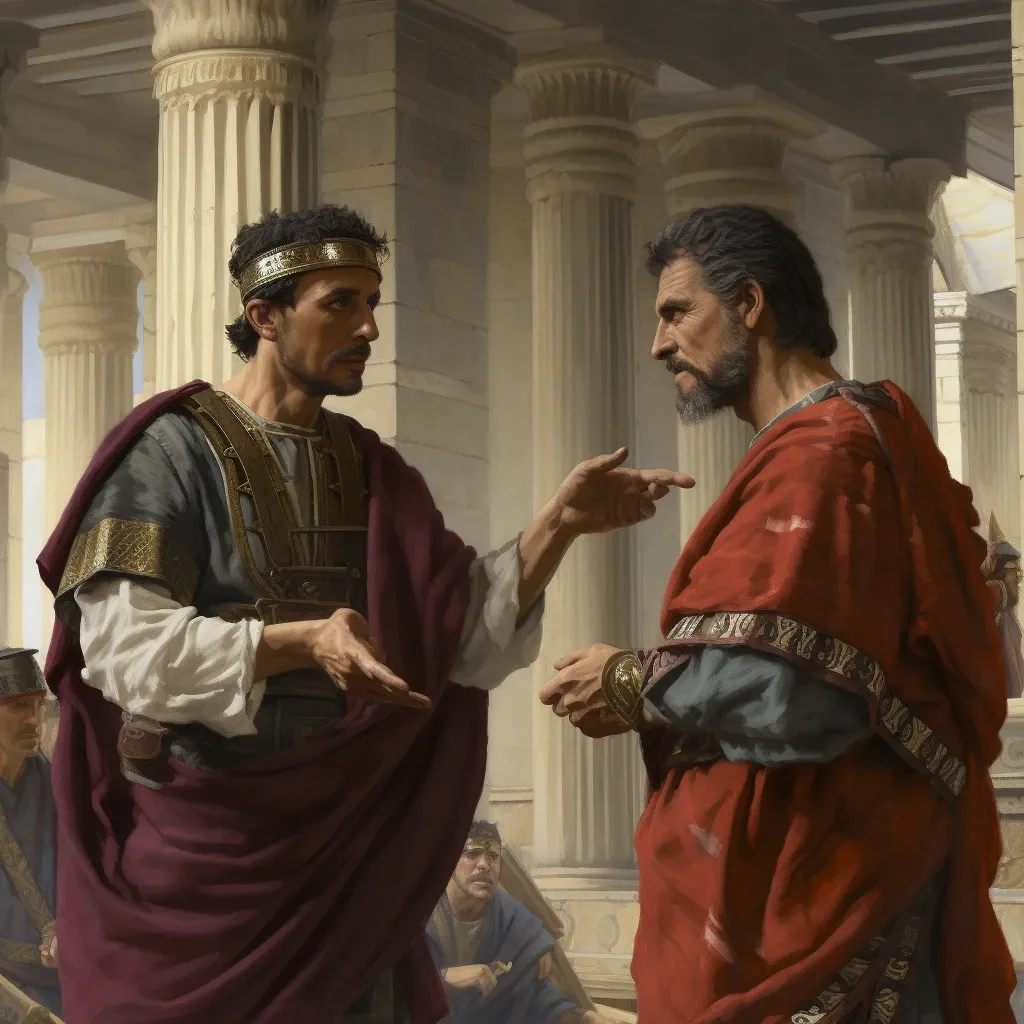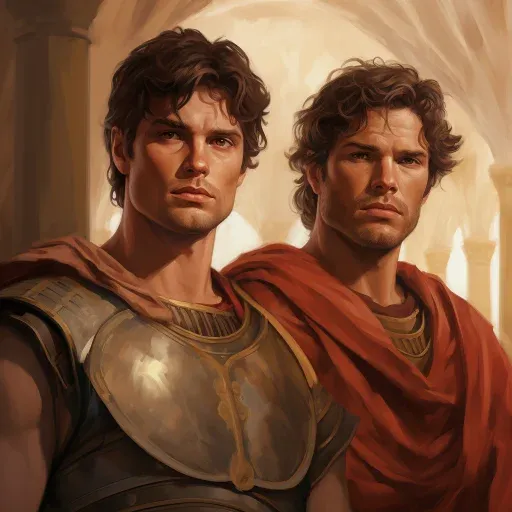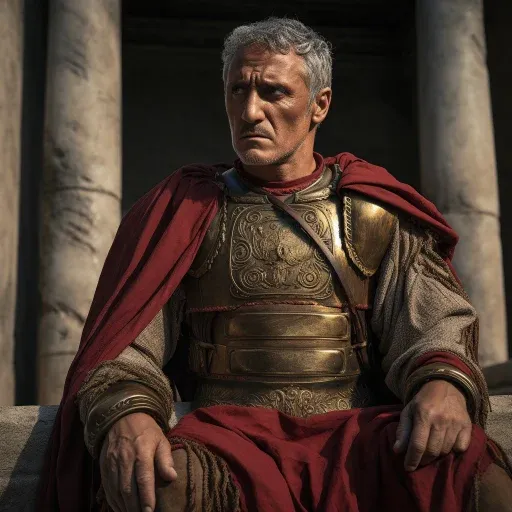BY JAMES BALDWIN
How Decius Mus Saved Rome
Famous Stories Retold: Story 25 of 30

Heading

Self-Sacrifice: Publius Decius Mus, a Roman consul, performed a self-sacrifice (devotio) in battle to secure victory for Rome against the Latins in 340 BC.
Historical Impact: Decius Mus's sacrifice is remembered as a pivotal moment in Roman history, showcasing the valor and dedication expected of Roman leaders.
A good book we like, we explorers. That is our best amusement, and our best time killer
- Roald Amundsen, Explorer
Decius Mus: Rome's Saviour in Battle
Step into the annals of ancient Rome, a time when valor was the order of the day and heroes were carved from the crucible of battle. Our tale recounts brave Decius Mus, an icon of Roman fortitude, who offered the ultimate sacrifice to protect the realm he loved dearly. His story is a testament to courage, resolve, and strategic genius. Discover how his selfless act altered the fate of Rome, shaping it into the dominant force it became. As you journey through this narrative, you'll uncover the secrets of Rome's survival in the face of overwhelming odds.
The Dawn of Battle: Rome vs The Latin Hosts
As the day broke more than two millennia ago, the young but tenacious Roman army awaited the inevitable clash with their Latin counterparts on the slopes of Mount Vesuvius. Outnumbered three to one, the Romans were the underdogs in this battle. However, the impending fight did not quench their unwavering spirit. Instead, it ignited their determination, as every soldier was prepared to sacrifice everything, even their lives, for the love of their country. This was a pivotal moment in Roman history, a moment that would either pave the way to greatness or lead to its downfall.
Unseen Visions: The Dreams of Decius Mus and Manlius Torquatus
Decius Mus and Manlius Torquatus, the Roman consuls and leaders of the Roman army, were riddled with anticipation before the battle. Their anxious wait was painted with visions. Both had dreams that seemed to be proclamations from the gods. They envisioned a gray-eyed maiden in radiant armor who delivered a cryptic message. The dream indicated that the army that loses its general in the battle would claim victory, a prophecy that was both unsettling and intriguing. Their dreams were so vivid and so identical that it was impossible to dismiss them as mere illusions.
Podcast
A Divine Message: Interpreting the Dreams
Upon the revelation of their dreams, Decius and Manlius immediately contemplated the true meaning of these divine visions. The prophecy was clear: The army that loses its general would triumph over the other. They both agreed that this message from the gods meant that a Roman general's demise during the battle would ensure Rome’s victory. It was a heavy burden to bear, yet both Decius and Manlius expressed their readiness to sacrifice their lives for Rome. Their unwavering commitment to their country was an embodiment of Rome's indomitable spirit.
The Ultimate Sacrifice: Decius Mus's Heroic Decision
After understanding the divine message, Decius Mus makes a decision that echoes through the annals of Roman history. This decision is not made lightly, but with the full understanding of the dire consequences. Mus, a dedicated soldier, and consul of Rome, chooses to sacrifice his life for the love of his country. His decision is not driven by a desire for glory, but by an understanding that his death will ensure the survival of Rome. This thought is his only consolation as he prepares for the impending battle.
As a nobleman and a leader, Decius Mus's actions reflect his deep-seated commitment to Rome. His readiness to die for his country, for the Romans' collective future, is the ultimate sacrifice. His action also sets a precedent for future Roman leaders who would have to make similar sacrifices in the face of adversity.

The Battle Begins: A Struggle for Rome's Future
With the first light of dawn, the battle commences. The Romans, prepared to fight to their last breath, face a foe that outnumbers them three to one. The Latin soldiers, confident in their numbers, underestimate the resolve of the Romans. The battle rages, and the Romans fight furiously, contesting every foot of ground.
The left wing, under Decius Mus's command, begins to waver first. Despite the initial setback, the Romans' spirit never wavers as they remember their leader's sacrifice. The battle becomes a crucial turning point for Rome's future, a fight for survival against formidable Latin forces.
Victory for Rome: The Legacy of Decius Mus
Decius Mus's sacrifice does not go in vain. His death stirs a cry of vengeance among the Romans, infusing them with a newfound resolve. They strike back, their only aim to obliterate their enemies. The Latin forces, thrown into panic and confusion, succumb to the Romans' relentless onslaught and flee.
Decius Mus's name becomes synonymous with courage and self-sacrifice. His legacy is carried forward in the hearts of the Romans, inspiring future generations. Decius Mus's sacrifice ushers in a victory for Rome, a victory that is a testament to his love and dedication for his country. His death is not an ending, but a beginning - a catalyst that propels Rome towards greatness.
Conclusion
In the face of imminent defeat, Decius Mus exemplified the quintessence of Roman bravery and strategic intelligence. His selfless act of sacrifice, influenced by divine dreams, catalyzed a turning point in the fierce battle against the Latin hosts. The Roman forces, fueled by a fervor for vengeance, rallied and emerged victorious, shaping the destiny of their beloved realm. Decius Mus's legacy, etched in the annals of Rome, will forever serve as a testament to the indomitable spirit that propelled Rome to its historical dominance. His story reminds us of the power of courage, sacrifice, and strategic genius.





